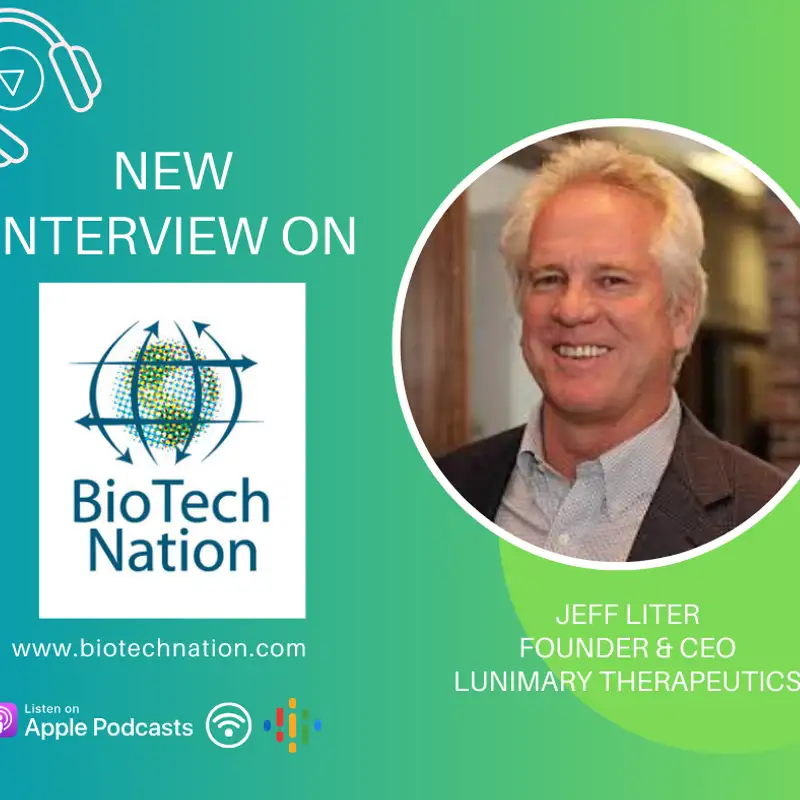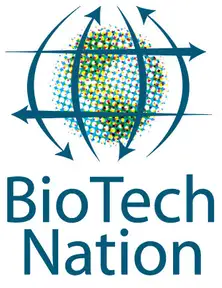Beyond the One-Size-Fits-All Cure... Jeff Liter, Founder & CEO, Luminary Therapeutics
Cell therapies, they've been a long time coming, and even now they're very expensive, primarily because to date, to be effective, we've had to formulate them specifically for each patient. What if that cost could come down and be more effective at the same time? Today I speak with Jeff Liter, the President and CEO of Luminary Therapeutics. Well, Jeff, welcome to Biotech Nation.
Jeff Liter:Thank you so much for having us. We really appreciate it.
Dr. Moira Gunn:Well, to me, this is a story of three scientists and a guy, and you're the guy.
Jeff Liter:That is correct.
Dr. Moira Gunn:Yes. There is. So So tell us, who are the three scientists? What were they working on? How did this come together?
Dr. Moira Gunn:And where is the guy involved?
Jeff Liter:Sure. So, at the University of Minnesota, there are three scientists named David Larcasvada, Brandon Moriarty, and Bo Weber. And I accidentally bumped into them in early twenty sixteen, and they were working on engineering immune cells. And I had just come from a place where I was doing manufacturing work with engineered immune cells. And so we just accidentally got to talking to start a company.
Jeff Liter:And we formed our first company called Beamogen in 2016, where we developed a method to engineer these immune cells in a brand new novel way that was much more cost effective than the way they typically are engineered.
Dr. Moira Gunn:But you're luminary now. Did you just change your name?
Jeff Liter:No, we sold that company in 2019 and decided that the four of us, the three scientists and a guy, worked really well together. So we said, Well, let's develop a therapeutic company where we could use engineered cells to cure cancer as well as autoimmune disorders. And more importantly than that, we wanted to solve some very technical problems in the cell therapy space. So we set out to make cell therapies much more accessible by creating a new way to manufacture those particular cell therapies so that they could be accessible. Right now, may not be known to your users, but today for cell therapies, that's only available to twenty percent of the people who really need it.
Jeff Liter:So there's eighty percent of the people who are not getting treated with cell therapies that could benefit from that.
Dr. Moira Gunn:Why only twenty percent?
Jeff Liter:Yeah, so right now for cell therapy, in order to get that treatment, you have to use the sick patient's cells. And that's where the current standard of care is. And it's very expensive to be able to take the cancer patient's cells, remove them from them, ship them off to a manufacturing center, and then ship them back. It's extremely expensive, and it's just only available at the major cancer centers. So we felt that there was a way to make many out of a healthy donor rather than the sick patient, where we could effectively make that product available to many, many patients that's off the shelf at the hospital waiting for them.
Dr. Moira Gunn:Well, words, words, words. You could say that all you want. Now let me just ask one little question here. I get a confirmation on what you just said earlier. When they take the cells from the sick patient, their patient's own cells, and they send them off to that center, not just to create more of them, but they engineer them to come back and fight their own cancer, right?
Jeff Liter:Yes, that's exactly right. They engineer them and to recognize the cancer.
Dr. Moira Gunn:Now let's acknowledge, you know, we've done very well with this personalized or individual cancer therapy. Some of you may be familiar with it, it's called CAR T. But this new approach, this next generation approach, which Luminary is working on, tell us what you're trying to do and why it can work.
Jeff Liter:Yeah, so the work that we're doing at Luminary is we're able to take a very small subset of immune cells that effectively can go into any patient without causing harm. And within that very small subset, there's two kinds. There's one that's called a V delta gamma one and a V delta gamma two. And the beauty of our product is we put both of those together, and the V delta 2s will act as a rapid shock and awe to the system to kind of clear as many as they can, but they don't persist and they go away. Whereas the V delta 1s will persist longer and clean up anything on Aisle 8 that didn't get cleaned up before.
Jeff Liter:So that's a unique approach from Luminary that we're quite excited about getting into the clinic.
Dr. Moira Gunn:The old one two punch. Is that what you call it?
Jeff Liter:Exactly. Yeah. Yeah. And as
Dr. Moira Gunn:I understand it, you're hitting three different receptors on the cancer cell. So if one can reject it, another one can't. Is that the idea?
Jeff Liter:That is exactly correct. Most of the companies that are out there, you only use one antigen, but we've engineered these in a fashion where we can attract three different receptors, as you noted, and we only need one of those to be present for the connection to be made between the cancer cell and the immune cell where it gets clearanced. These are engineered in a fashion where they have three receptors on each cell. And to make clearance happen for those cancerous or pathogenic cells, we only need one of those three. So those cells are it's very hard for them to escape our particular product.
Dr. Moira Gunn:Preliminary has six programs underway, including head and neck cancer, and and a number of others. You have three in phase one in humans. One is for multiple myeloma, one for non Hodgkin lymphoma, and one for lupus. Now tell us about these trials. How big are they?
Dr. Moira Gunn:Who are you treating? How long will it take to read out?
Jeff Liter:Yeah, so as you noted, these are phase one trials. And in each one of those three trials, we're looking to treat between fifteen and eighteen patients. For the non Hodgkin lymphoma, that's the one that we're the furthest ahead on. We have treated four patients to date and had very good results. On the multiple myeloma, we have treated one patient.
Jeff Liter:And then on the lupus trial, we expect to treat our first patient within the next three weeks.
Dr. Moira Gunn:Is this all the same drug?
Jeff Liter:Yes, it is. And the fact that we've engineered these cells to have these three different receptors give them a broad application, which is why we were able to create three different trials using the same drugcell therapy.
Dr. Moira Gunn:So what is it like being in these trials?
Jeff Liter:Yeah, so for the patient, effectively they come in and they go through a process to get the cells, and then that's an infusion that happens to them. They typically are staying around the hospital for two or three days just to make sure that there's no side effects. And then effectively, it's a one dose. So that's all they need is a single dose. In many cases, we're hoping for a cure just from that single dose.
Dr. Moira Gunn:Now, while they're hanging around the hospital for three days, this is phase one. You don't anticipate in the future, if this all comes to fruition, that they will have to spend that kind of time.
Jeff Liter:We do not. So the ability to treat side effects is getting better and better, and the side effects are very minimal compared to chemotherapy. And so they will be able to be treated as an outpatient in the future.
Dr. Moira Gunn:You keep talking about accessibility. You're in Minnesota. The cells are manufactured somewhere probably in Minnesota. How are you making them accessible? Why can they be so much more accessible?
Jeff Liter:So once they've been engineered, they're frozen to a very, very low temperature called cryopreservation, and they're able to be shipped anywhere across the world. They can be sitting in any hospital for an off the shelf drug that a patient could get the same day they walked into the hospital.
Dr. Moira Gunn:So this is going to be delivered anywhere, can be delivered anywhere, ultimately. And that's the whole goal, so that if you have one of these cancers and you're eligible for the cell therapy will work for you, that you can get them because they'll actually they'll go into any human being.
Jeff Liter:That is exactly right. And we're looking to make sure that this product becomes available to the entire world who needs these drugs desperately.
Dr. Moira Gunn:Let's be clear. The three programs you have in phase one, two of them are cancers, and one of them is an autoimmune disorder, lupus. How does this work in the case of lupus?
Jeff Liter:So the B cells that are in a patient effectively can either become cancerous or they can become auto inflammatory. I know those are technical terms, but the same product wipes out those B cells either way, whether they're cancer or they're auto inflammatory.
Dr. Moira Gunn:So we're not just talking about treating cancer, we're talking about any number of chronic diseases here.
Jeff Liter:Yes, we are. And that's the true excitement of these cell therapies, that they have applications that go well beyond oncology and are moving into the autoimmune disorders with very, very good results.
Dr. Moira Gunn:How well is the CAR T therapy working itself?
Jeff Liter:So CAR T therapies for blood cancers get about a fifty percent cure rate with one single dose. So far, the data is still early, but in these autoimmune disorders, there have been eighty percent cure rates. So quite exciting times for cell therapy to transform the way medicine is practiced.
Dr. Moira Gunn:This is what I call the technology side. You know, better, faster, cheaper. Hey, this works. Can we get it to you better? Can we get it to you faster?
Dr. Moira Gunn:Can we get it to you cheaper?
Jeff Liter:Exactly right. And that's what we've been focused on as a company since we started Luminary Therapeutics.
Dr. Moira Gunn:Well, thank you so much, Jeff. Please come back and see us again. Keep us updated, if you will.
Jeff Liter:We would love to.
Dr. Moira Gunn:I've been speaking with Jeff Liter, the President and CEO of Luminary Therapeutics in Minneapolis, Minnesota. More information is available on the web at luminarytx.com.

